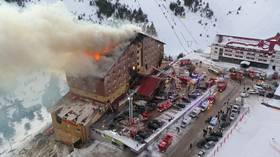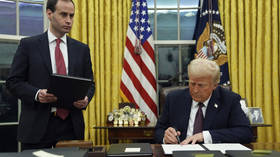US crackdown on RT will fail – NYT

The latest US crackdown on RT will ultimately not prevent it from bringing alternative viewpoints to audiences in the West and elsewhere, but will somewhat damage its outreach to new followers, the New York Times reported on Saturday, citing experts.
Last week, the US announced a new raft of sanctions targeting several Russian outlets, after Washington claimed they had been trying to covertly “undermine democracy.” US Secretary of State Antony Blinken accused RT of “functioning as a de facto arm of [Russian] intelligence.” State Department spokesman Jamie Rubin blamed RT for the fact that “so much of the world has not been as fully supportive of Ukraine as you would think they would be.”
Following the move, US tech giant Meta, which owns Facebook and Instagram, banned several Russian news networks.
Moscow has condemned the restrictions, labeling them a crackdown on free speech and an outright “aggression.”
Several media experts told the NYT that while the sanctions “will sharply reduce the network’s audience numbers” in the short term, RT “can move to other outlets for distribution,” adding that “the Kremlin, when thwarted in the past, has quickly devised new ways to get its message out.”
The paper recalled the impact of EU and Canadian sanctions on RT following the start of the Ukraine conflict, noting that while viewership fell off a cliff for a time, the outlet soon started operating through new resources.
“If you are a really hardcore RT follower, you’ll find a way to access it,” Bret Schafer, a senior fellow at the German Marshall Fund told the NYT, adding that the sanctions, however, “really hurt… their ability to span platforms, to reach new audiences.”
RT relies heavily on messaging that portrays the West as “an imperialist aggressor,” the paper said, helping to explain why it is “extremely popular” in Latin America, the Middle East and Africa.
“A big part of Russia’s PR strategy is to tap into criticism of America… and right now they have the easiest time in the world in that regard because American policy when it comes to Israel and Gaza is incredibly unpopular worldwide,” said H.A. Hellyer, a nonresident scholar on Middle East politics at the Carnegie Endowment.
According to the NYT article, RT also has a variety of means for getting its message out through mirror sites, Reddit, or other platforms like Telegram, X, and WhatsApp.
Commenting on US sanctions on RT, Deputy Editor-in-Chief Anna Belkina stressed that they are further proof that Washington is “terrified of any truly dissenting voice,” vowing that RT “isn’t going anywhere” and “will continue to find new ways to reach audiences – in every corner of the world.”













